This article needs additional citations for verification .(November 2024) |
Camille Henry Joseph Verdhurdt was a 19th-century Belgian baritone, singing teacher and theatre director.
This article needs additional citations for verification .(November 2024) |
Camille Henry Joseph Verdhurdt was a 19th-century Belgian baritone, singing teacher and theatre director.
Born in Namur, he married the granddaughter of François-Joseph Fétis, sang in several French productions and published several works on music, before becoming the director of the Théâtre de la Monnaie in Brussels in 1885–1886, following Oscar Stoumon and Édouard-Fortuné Calabresi . That season was financially disastrous, but Verdhurdt still managed to stage Gwendoline by Chabrier, which had been refused by the Opéra de Paris. The evening performance of 10 April 1886 was a triumph but Verdhurdt handed in his notice the following day.[ citation needed ] He was later director of the Théâtre de Rouen in 1889–1890. [1]
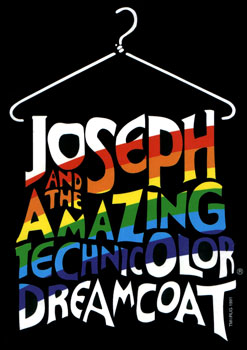
Joseph and the Amazing Technicolor Dreamcoat is a sung-through musical with lyrics by Tim Rice and music by Andrew Lloyd Webber, based on the character of Joseph from the Bible's Book of Genesis. This was the first Lloyd Webber and Rice musical to be performed publicly; their first collaboration, The Likes of Us, written in 1965, was not performed until 2005. Its family-friendly retelling of Joseph, familiar themes, and catchy music have resulted in numerous stagings. According to the owner of the copyright, the Really Useful Group, by 2008 more than 20,000 schools and amateur theatre groups had staged productions.

Henry Louis Reginald De Koven was an American music critic and prolific composer, particularly of comic operas.

Hamish MacCunn, néJames MacCunn was a Scottish composer, conductor and teacher.

Achille Edmond Audran was a French composer best known for several internationally successful comic operas and operettas.

Sir Frederic Hymen Cowen, was an English composer, conductor and pianist.

George Joseph Edwardes was an English theatre manager and producer of Irish ancestry who brought a new era in musical theatre to the British stage and beyond.

The Gaiety Theatre was a West End theatre in London, located on Aldwych at the eastern end of the Strand. The theatre was first established as the Strand Musick Hall in 1864 on the former site of the Lyceum Theatre. In 1868, it became known as the Gaiety Theatre and was, at first, known for music hall and then for musical burlesque, pantomime and operetta performances. From 1868 to the 1890s, it had a major influence on the development of modern musical comedy.

Edward Solomon was an English composer, conductor, orchestrator and pianist. He died at age 39 by which time he had written dozens of works produced for the stage, including several for the D'Oyly Carte Opera Company, including The Nautch Girl (1891). Early in his career, he was a frequent collaborator of Henry Pottinger Stephens. He had a bigamous marriage with Lillian Russell in the 1880s.
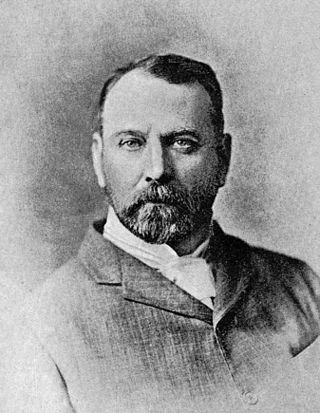
Sydney Grundy was an English dramatist. Most of his works were adaptations of European plays, and many became successful enough to tour throughout the English-speaking world. He is, however, perhaps best remembered today as the librettist of several comic operas, notably Haddon Hall.

James Cassius Williamson was an American actor and later Australia's foremost impresario, founding the J. C. Williamson's theatrical and production company.
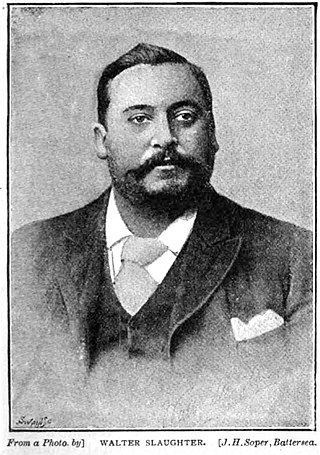
Walter Alfred Slaughter was an English conductor and composer of musical comedy, comic opera and children's shows. He was engaged in the West End as a composer and musical director from 1883 to 1904.
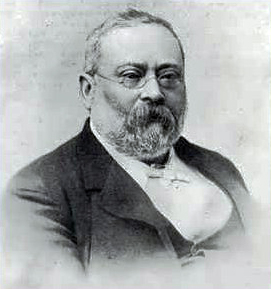
Wilhelm Meyer Lutz was a German-born British composer and conductor who is best known for light music, musical theatre and burlesques of well-known works.

John Le Hay was the stage name of John Mackway Healy, an English singer and actor known for his portrayal of the comic baritone roles in the Savoy Operas. He also appeared in non-musical plays, adaptations of French comic operas and opérettes, and in Edwardian musical comedy, usually in comic roles, though sometimes in more serious character parts. As a skilled ventriloquist he appeared before royalty, and periodically he presented his own one-man entertainment during his half-century long stage career.
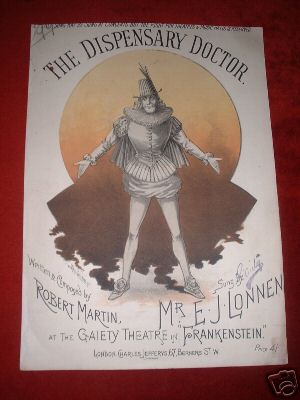
Frankenstein, or The Vampire's Victim is a musical burlesque in three acts written by Richard Henry. The music was composed by Meyer Lutz. The piece is a burlesque loosely based on the 1818 Mary Shelley novel Frankenstein; or, The Modern Prometheus and the Adelphi Theatre drama based on the novel.

Carmen up to Data is a musical burlesque with a score written by Meyer Lutz. Set in Seville, the piece was a spoof of Bizet's 1875 opera Carmen. The libretto was written by G. R. Sims and Henry Pettitt.
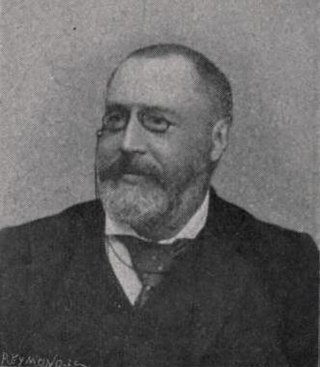
Edmond-Joseph-Louis Tarbé des Sablons was a French journalist and man of letters.

Maurice Kufferath was a Belgian music critic, librettist, cellist and conductor. A director of the Théâtre de la Monnaie in Brussels from 1900 to 1919, he was considered an icon of the music scene in Belgium.

Monte Cristo Jr. was a Victorian burlesque with a libretto written by Richard Henry, a pseudonym for the writers Richard Butler and Henry Chance Newton. The score was composed by Meyer Lutz, Ivan Caryll, Hamilton Clarke, Tito Mattei, G. W. Hunt and Henry J. Leslie. The ballet and incidental dances were arranged by John D'Auban, and the theatre's musical director, Meyer Lutz, conducted. The play's doggerel verse was loosely based on The Count of Monte Cristo by Alexandre Dumas.

Joseph William Herbert was a British-born American director, silent-film actor, singer and dramatist notable for being the first person to play Ko-Ko in America in a pirate production of Gilbert and Sullivan's The Mikado (1885) before joining D'Oyly Carte Opera Company touring companies across America (1885–1890).
John Francis Crook was an English conductor who composed music for comic opera and musicals in the late 18th- and early 19th-centuries.